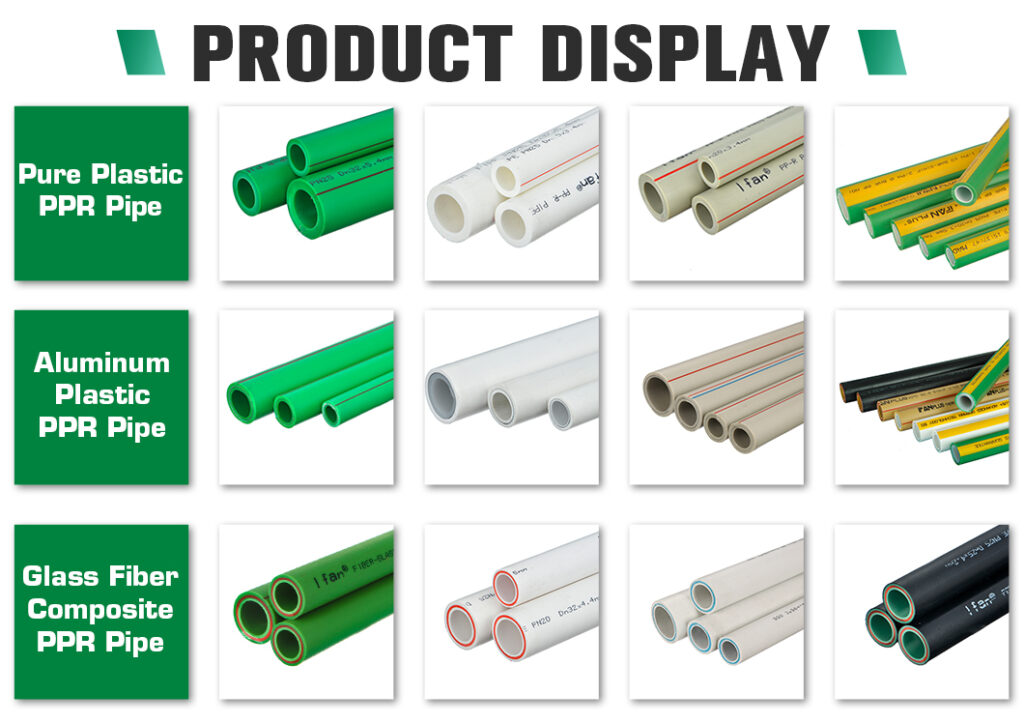Introduction:
The Versatility of PPR Pipes: Applications and Sustainability
PPR (Polypropylene Random Copolymer) pipes have gained prominence in various modern industries due to their remarkable performance and eco-friendly attributes. This article delves into the wide-ranging applications of PPR pipes across different sectors and highlights their key advantages, particularly their sustainability features.IFAN factory 30+ years manufacture experience support color/size customization support free sample.Welcome to consult for catalog and free samples.This is our FacebookWebsite: www.facebook.com.
1. Construction Industry:
The construction industry heavily relies on PPR pipes for plumbing and heating systems. Key advantages include:
High Pressure Resistance: PPR pipes can withstand substantial water pressure, ensuring reliable water supply systems.
Corrosion Resistance: PPR pipes are impervious to chemical corrosion, resulting in long-lasting plumbing systems.
Non-Toxic and Environmentally Friendly: Composed of non-toxic polypropylene, PPR pipes meet hygiene standards, making them safe for potable water.
2. HVAC Systems:
In the HVAC industry, PPR pipes are preferred for their exceptional heat conductivity, making them ideal for heating systems. Their smooth inner surface reduces water flow resistance, enhancing the efficiency of hot water circulation.
3. Medical Facilities:
PPR pipes are utilized in medical facilities for hygienic water supply systems. Their non-toxic and antibacterial properties ensure the purity of water, meeting strict healthcare standards.

4. Industrial Applications:
PPR pipes excel in various industrial settings, particularly in chemical processing plants and pharmaceutical facilities. Their resistance to corrosion makes them ideal for transporting corrosive chemicals without affecting product quality.
5. Agricultural Irrigation:
Agriculture benefits from PPR pipes for irrigation systems. These pipes withstand high water pressure, UV exposure, and various weather conditions, contributing to long-term sustainability in agriculture.
6. Fisheries:
In the fisheries sector, PPR pipes are pivotal for aquaculture systems. Their resistance to corrosion and durability make them suitable for both freshwater and marine aquaculture, supporting sustainable fish farming.
7. Environmental Sustainability:
PPR pipes stand out in terms of sustainability. Compared to metal pipes, their manufacturing and installation processes have a smaller carbon footprint, and they are recyclable. Their durability reduces maintenance requirements and extends their lifespan, resulting in reduced resource consumption.
Conclusion:
PPR pipes have found their way into numerous industries due to their outstanding performance and eco-friendly qualities. Whether in construction, HVAC, medical, industrial, agriculture, or fisheries applications, PPR pipes provide reliable solutions. Their sustainability and environmentally friendly features make them a preferred choice in an era that prioritizes eco-conscious practices. As technology advances, the PPR pipe industry is set to continue playing a pivotal role in providing durable, efficient, and sustainable solutions across diverse sectors.

